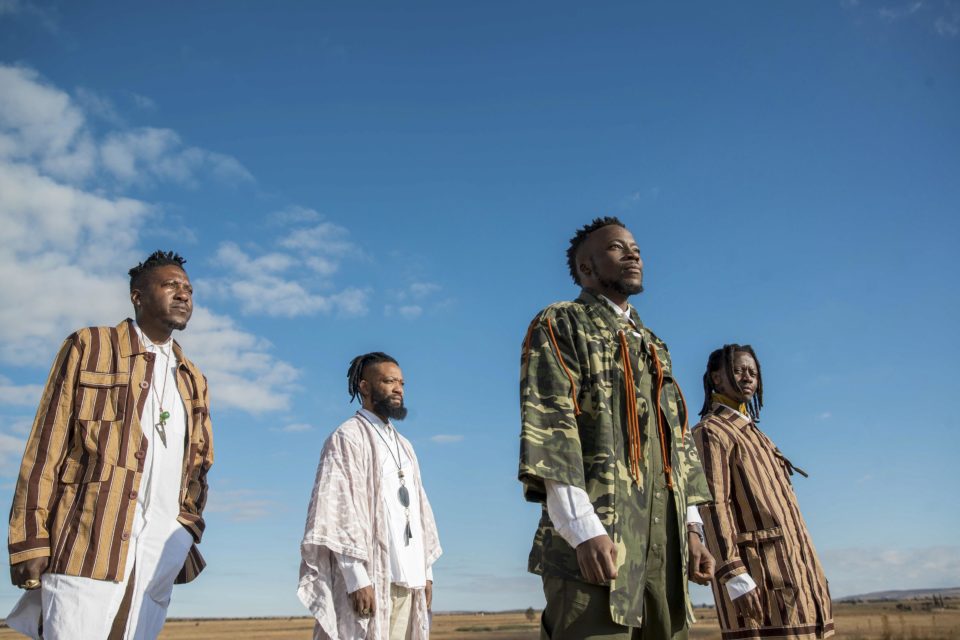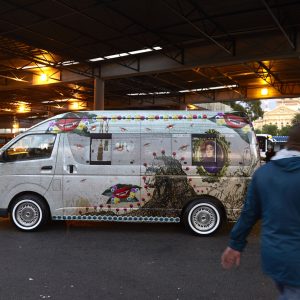Urban Village are sonic archivists
By capturing and preserving the everyday sounds of the city and the musical influences that shape our present, the Soweto-based quartet brings the rural home to the metropole.
Author:
27 July 2021

Johannesburg’s public transport terminals are a visceral experience. Portions of fruit and veg piled on cloth laid out on the pavement are sold alongside portable food like amagwinya and polony. Crafters carve, sculpt, build and thread, doing their art in close quarters, while shoppers dig through mounds of clothes at improbably low prices. Makeshift tables made of boxes covered in bright-coloured plastic promise all manner of biscuits, chocolates, sweets and chips, including chilli or cheese-flavoured air puffs that melt in the mouth and stain the fingers. Traders selling a variety of wares shout out their offerings.
It is a sensory confluence of food, sound, taste and scent, flanked by throngs of commuters and touch-the-sky buildings. It is also the source of inspiration for Soweto-based quartet Urban Village.
With mbaqanga references and a harmonica threading through the melody, Empty K-Set, a song on the band’s newest album Udondolo, locates listeners in the cityscape and archives the sound of the peddlers who used to sell blank TDK cassettes from the high-traffic Small Street in Joburg’s central business district:
Related article:
“Attention all passengers – treni ya 512219 Naledi to Park Station e tlatswa platform 1…
Jikeleza Springs 20519 – first stop Ntlanzani e tlatwsa platform 3…
Empty empty empty cassette
Empty empty empty cassette
Two for R5, empty cassette.”
Guitarist Lerato Lichaba got the idea to start a band that musically renders the sounds of the country in music in 2013, and the next year he invited multi-instrumentalist Tubatsi Moloi to help him with the project. The duo worked together for almost a year-and-a-half before Mojalefa Mofokeng joined them on percussion and vocals. Mofokeng followed his pastoral calling and left, but drummer Xolani Mtshali and bassist Simangaliso Dlamini filled the gap, and the collective was complete.
Moloi, a vocalist, flautist and mbira player, explains that the band was preoccupied with how to preserve musical cultures indigenous to the country, including mbaqanga, maskandi and music of isiXhosa and Sesotho. “All the music of all the African people who are bringing it into this space. How do we preserve that in the time we’re living in? [Without dropping the Western influence,] how do we blend them together?”
The result was the EP Bantu Art, recorded and released five years ago. “We managed to raise a bit of money to record Bantu Art,” Moloi says. “We pushed that on our own. [It was] reaching people’s ears [and] doing well.”
What’s in a name?
The band’s name, Urban Village, alludes to the straddled identities of migrant workers from different parts of the country and the continent. In Joburg, the promise of work – and the so-called “better” life – magnetically pulls people away from home, family, land and roots. Villagers then need to acclimatise to urban life, and this is what the music tries to capture and recognise.
“Urban”, which signifies a town or city, has become historically attached to the idea of Western modes of being and culture, while “village” in South Africa conjures rural settings, and African modes of being. The group’s music wants to find a way for these worlds to live together.
“The main thing was to restore our identity as Africans and run away from the [purely] Western way of presenting music,” says Dlamini.
Placing the words and worlds “urban village” alongside each other, the group blends these ideas and states of being, so there’s a collaboration between the city and the rural, the Afrikaans and the English, and the Sesotho and the isiZulu. Their goal is to create a world where everyone can coexist naturally, seamlessly and symbiotically.

As their song Sakhisizwe says in a groove reminiscent of Johnny Clegg and Ladysmith Black Mambazo:
“Take me by the hand and lead me down the road A road to a place where every soul is one…
The elders share wisdom
Angithi uyazi indlela, ibuzwa kwabaphambili
Yimi, nguwe sakhiziswe…
Sibambisene, sakhisizwe (You and I are building the nation together)
Moloi explains that one of the aims of the band is to “create a space where the conversation and the music [are] one … bringing together the things that don’t really get together. Changing our thinking for the future and changing this generational crisis that we’re going through – doing something different.”
Musical influences
Mtshali says founder Lichaba is the driver behind the principle of preserving South African sounds.
“The one thing that we’ve seen that makes bands thrive is the philosophy,” Mtshali says. “When you get together and you don’t have a philosophy, it’s just nice sounds … We’re sonic archivists – you archive the music of the old and bring it into the now generation so that we don’t get stuck in a certain era. This is what we’re doing for South African music.”
Moloi agrees: “There’s also research – if you listen to Sakhisizwe, the song has elements of Paul Simon [and] Ray Phiri with Ladysmith Black Mambazo’s Graceland. Dindi has [elements of musician] Mahlathini … That’s how we preserve the sound [and] not the actual songs.” It’s a mode of presenting sonic reminders that transport listeners to the influences the musicians reference.
Related article:
“It gives you an opportunity to travel mentally, physically and spiritually into memory. [The music will] send you somewhere. It brings you back. Sometimes it keeps you somewhere.”
Dlamini says, “It’s difficult to say what genre Urban Village music is because it’s influenced by a lot. There’s funk, mbaqanga, mgqashiya. There’s a bit of blues in there – so, we can’t say what genre it is. It’s Urban Village music … It’s always blended with something. You’ll never find a song that’s straight blues or whatever. We also bring in our own influences as individuals.”
As they give in to the alchemy of music-making, as yet undiscovered influences will keep transforming and evolving their sound.
Debut album
This philosophy, range of influences and approach to music has coalesced in the arrival of their debut album Udondolo, released through the Parisian independent record label Nø Førmat.
The group met Thibaut Mullings from the label three years ago. Liking what he heard and thinking the band would be a good fit for the label, Mullings invited Nø Førmat’s director Laurent Bizot to South Africa to watch Urban Village perform at the Olive Tree Theatre in Alexandra.
The label has “a great catalogue: Oumou Sangaré [Grammy Award-winning Malian Wassoulou singer], Ballaké Sissoko [Malian player of the kora] – and they’re always looking for something authentic and organic from Africa,” Moloi says.
The album’s title is a reference to “a walking stick”, Lichaba says. “Udondolo is a sign of wisdom. It can protect you. It shows your growth into obambelele kuyo [something you are holding on to] … With this stick, you can walk through any forest. That’s why we chose the name.

“Through Udondolo, we’re not just trying to release a musical project but something esizokhula nayo [that we are going to grow up with]. Even with the music and the messages behind the lyrics, it’s those things which are supposed to be udondolo in people’s minds and hearts. More than a CD or vinyl, Udondolo is that invisible spiritual baton.”
For Moloi, the title acknowledges those who walk alongside the band as their support. “[It suggests] a friend that’s always there with you and has walked where you’ve walked. Even if you see two footprints you’ll see a third one on the side, which is that support structure … [It] refers to the energy that is always with us wherever we go, kuko konke esikwenzayo [in everything we do] … Helping us to move within space and navigate through this life.
“Lerato came up with the actual name as we were trying to figure out [how to articulate] the support. A thank you, also, to the community and people who’ve been with us, holding us, assisting us and supporting us everywhere we go – the third part of the village … We don’t have fans but we have villagers who have walked with us – they are udondolo.”
Moving forward collectively as a community is the village way. Being held and seen by familiars reminds us not only of who we are but also of where we come from. Urban Village’s music timestamps this way of life through acknowledgement, recognition and reverence.
Watch a recent live Urban Village performance here.


